This WW2 will likely strain the colonial empires less than in OTL. The sight of nonwhite Japanese troops defeating British, French, Dutch and American and occupying their colonial possessions helped discredit the idea of european superiority and the moral legitimacy of colonialism itself. The fall of Singapore to Japan was a humiliation the British Empire never recovered from.
In this timeline, Japan has only been fighting in China, Manchuria, and the USSR so the colony administrations of south and southeast asia will end the war more or less intact. The lack of a North African front will affect the trajectory of Arab nationalism and the middle east more generally.
Having an extant fascist Italy around is a good way to make the world much more authoritarian and repressive. Some cold war-era military dictators in the third world like Jean-Bedel Bokassa may have looked to Napoleon as a historical example, but they lacked an ideological to legitimate their rule. In this world dictators, military juntas, and anti-colonial nationalists have fascism as a complete ideological package to grab off the geopolitical shelf, so to speak.
The Park Chung Hees and Somozas of this would could label themselves as fascism with X country characteristics if they can get weapons or money from Italy, or try to rally their populations behind an ideology. OTL, El Salvador joined the Anti-Comintern Pact because the dictator in power at the time admired Mussolini and Hitler.
In this timeline, Japan has only been fighting in China, Manchuria, and the USSR so the colony administrations of south and southeast asia will end the war more or less intact. The lack of a North African front will affect the trajectory of Arab nationalism and the middle east more generally.
Having an extant fascist Italy around is a good way to make the world much more authoritarian and repressive. Some cold war-era military dictators in the third world like Jean-Bedel Bokassa may have looked to Napoleon as a historical example, but they lacked an ideological to legitimate their rule. In this world dictators, military juntas, and anti-colonial nationalists have fascism as a complete ideological package to grab off the geopolitical shelf, so to speak.
The Park Chung Hees and Somozas of this would could label themselves as fascism with X country characteristics if they can get weapons or money from Italy, or try to rally their populations behind an ideology. OTL, El Salvador joined the Anti-Comintern Pact because the dictator in power at the time admired Mussolini and Hitler.
Last edited:





